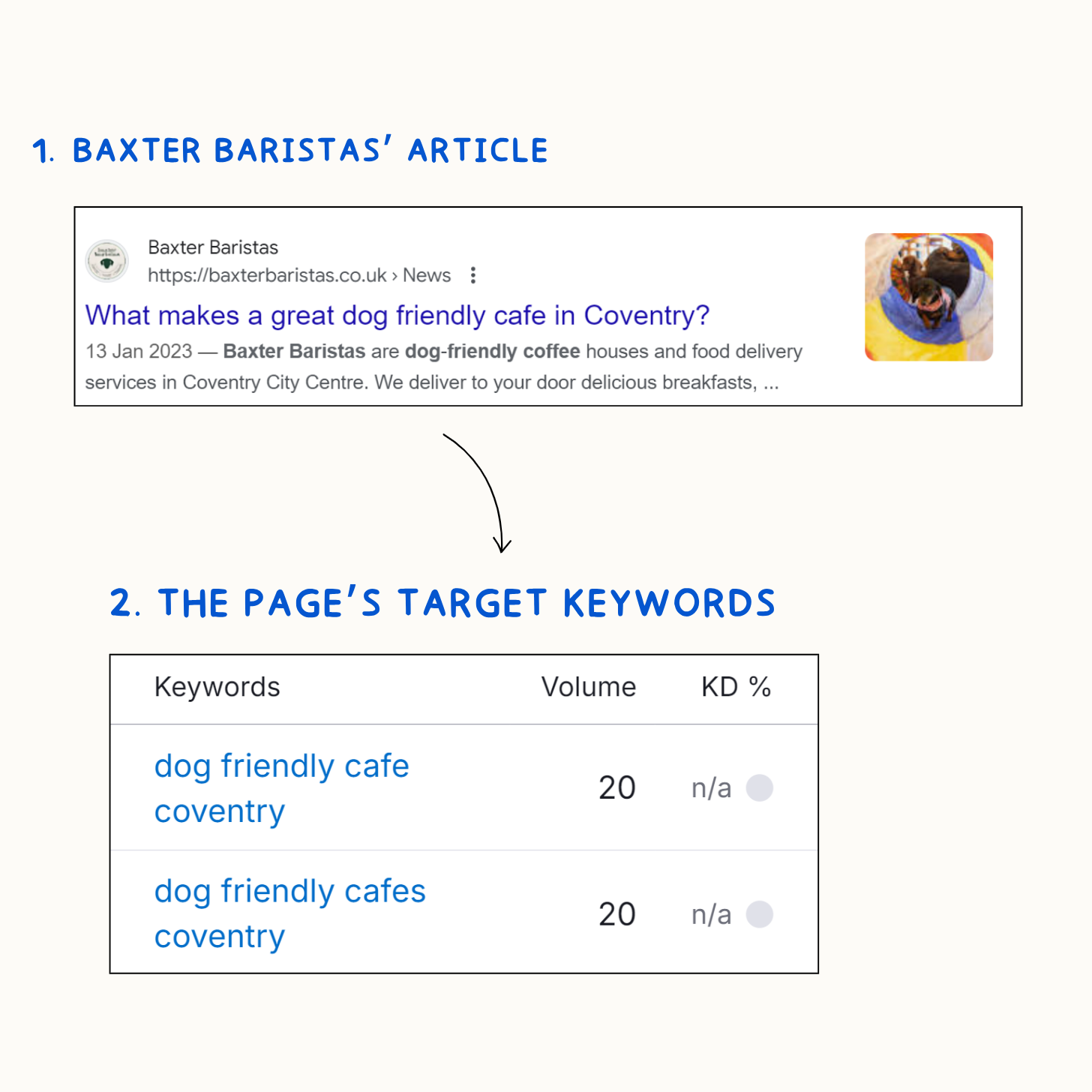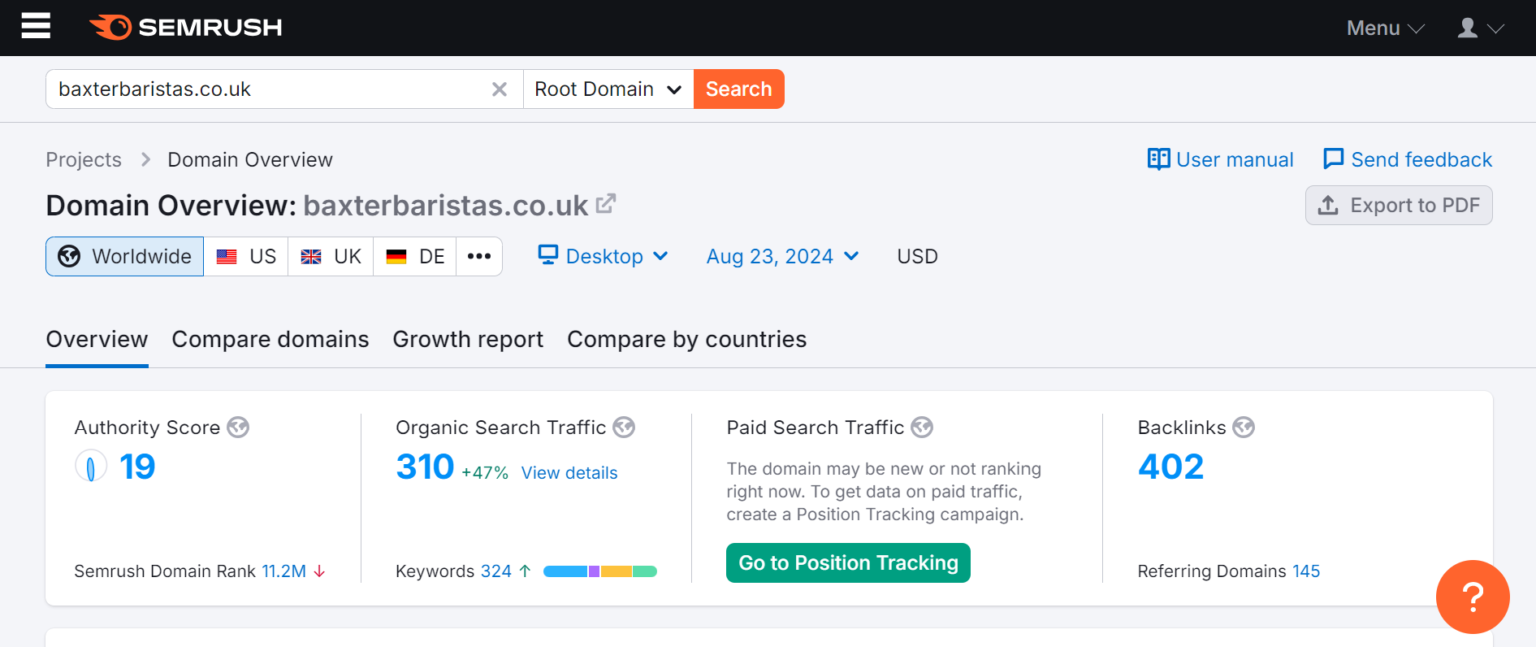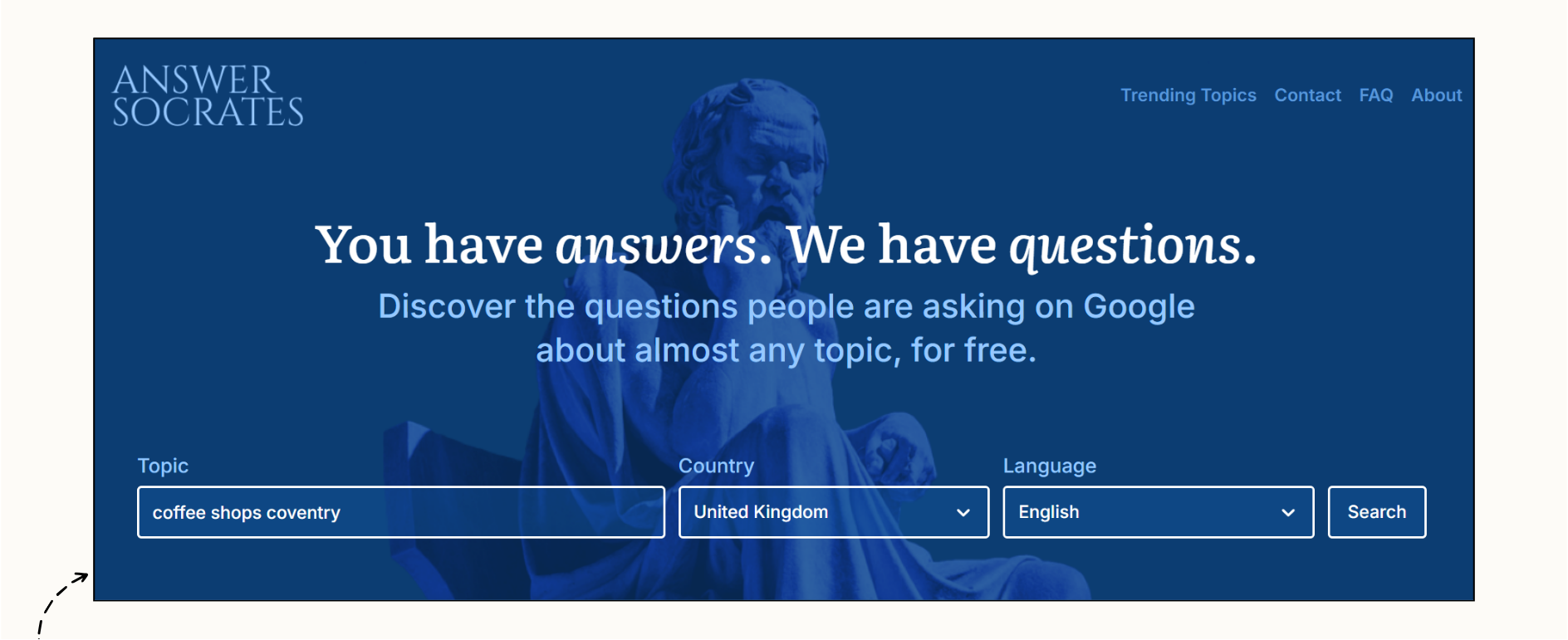We’ll dig into how to do SEO for Coventry businesses, but first – a scenario.
Picture this:
You own a cozy coffee shop that sits right around the corner from the Coventry Cathedral.
And you brew the best coffee in town – fresh cups of espresso and chai latte that make customers forget they’re running late to work.
The taste of your coffee doesn’t matter if people don’t know where to find you.
Sure, you might get some visits from folks who are drawn by that charming sign hanging outside your front door or the smell of coffee drifting through the air.
You could have grateful customers spreading the word, posting photos on Instagram, or leaving glowing reviews on Yelp.
Maybe you’re handing out flyers, or you’ve partnered with a local bookshop to host events that pull in a crowd.
All these tactics are great and can definitely bring more people through your doors.
But SEO is how you get more visitors long after the flyers are gone and the event is over.
It’s how you get your website to show up first when new UNI students move into town and Google coffee shops in coventry.
How SEO can grow your Coventry business
While social media posts and word of mouth can get the ball rolling, SEO is what keeps your business top of the list day in and day out.
So you’re always part of the conversation.
And that’s only one example.
Whether you’re running a coffee shop, bakery or roofing business, the same rule applies:
You can use SEO to get in front of more customers.
And if there was ever a great place to do SEO, it’s Coventry.
Folks here are searching for everything online, from where to get the best Indian takeaway in the city to who can fix a leaky roof.
If your business isn’t popping up for these local searches, you’re missing out (we’ll touch on to local keywords later on in this guide)
I’m a freelance SEO consultant with over 4 years of experience.
I’ve helped dozens of Coventry businesses use SEO to sell more.
So I know a thing or two about ranking businesses in Coventry.
Need help brushing up your SEO strategy for the Coventry area? Find out more about my services below:
But if you’re looking for a more DIY approach, I’ve put together a no-nonsense guide to show you exactly how to nail SEO in the area.
Thousands of hours worth of research packed into a simple, practical guide. No fluff.
Let’s get started.
Use the Table of Contents below to navigate to the areas you’re interested in.
How to analyse your competitor's Coventry SEO strategy
Imagine trying to win a game of chess without knowing your opponent’s moves.
That’s what you’ll be doing if you dive into SEO without sizing up the competition first.
Dramatic analogy? Maybe.
But the point is this: before you obsess about keywords, you should know who you’re up against.
Competitor analysis is a great (if not the best) place to start.
It shows you what’s working for your competitors and what’s not; where they’re killing it and where they’re dropping the ball.
I love scenarios. So let’s go back to that coffee shop scenario.
Let’s say we found out that there’s a rival coffee shop that’s ruling the search results because they nailed local SEO, but their website speed is slower than a snail on a rainy day.
That would be our opportunity to swoop in and take their throne.
By understanding what your competitors are doing right— and wrong — you’re getting a better idea of what you need to rank better.
Moral of the story? Before you dive headfirst into your SEO strategy, take a step back, pour a cup of coffee and scope out the competition.
This is how you do that:
Start by Googling your own keywords
Fire up Google and type in the keywords you think people in Coventry are using to find businesses like yours.
Check out who’s hogging the top spots.
These are your main competitors — the ones you need to beat.
Take a note of their website URLs because we’re going to dig deeper.
Find areas for improvement in your competitor's content
Visit their websites and look around.
What kind of content are they pumping out? Are they writing blog posts, offering free guides, or showcasing testimonials?
Notice the tone, the topics, and how they engage their audience.
The goal here is to figure out what’s working for them so you can do it better.
For example, Baxter Baristas have some content targeting people that are looking for dog-friendly cafes in Coventry.
And guess what? That’s a keyword people search.

I spent the good part of an afternoon writing a guide that explains how to analyse your competitor’s content and use that insight to write better content.
Dig into data with SEO tools
SEO tools like Ahrefs, Semrush, and Mangools are an SEO’s best friend.
They’re packed with features that can make your life as an SEO much easier.
So you get the kind of insights and data that would take hours, if not days, to gather on your own.
If you’re serious about building your site’s traffic, you should invest in one.
I personally use Semrush.
Pop in your competitor’s URL and let the tool do the rest:

You’ll see what keywords they’re ranking for, where their backlinks are coming from, and even what pages are driving the most traffic.
You can then use this intel to refine your own keyword strategy and find areas of improvement on their websites.
Alternatively, if you don’t want to pay for an SEO tool, you can also do keyword research for free.
These are some free tools you can use:
- Hoth Rank Checker – for analysing a site’s ranking keywords
- Ahrefs Backlink Checker – for analysing a site’s backlink profile
Keyword research for your Coventry business
Let’s go back to our coffee scenario.
Let’s say someone in Coventry is on the hunt for a cozy spot to grab a cup of coffee.
They’re not Googling best coffee uk.
No, they’re typing in best coffee shops in coventry.
The latter is an example of what what we call local keywords.
Local keywords matter because they connect you with the customers who are right there in your backyard, ready to waltz in through your door.
They help you cut through the noise of the internet so you’re seen by the people who actually have a shot at becoming your regulars.
Let me explain.
If your goal is to attract more local customers, focusing on local keywords should be your first priority.
It’s a better strategy: quality over quantity.
While a keyword like best coffee uk might attract more search volume, people searching that are spread all over the country and are less likely to step into your shop.
In contrast, someone searching for best coffee shops in coventry is far more likely to walk through your door.
Long story short, the local relevance of a keyword is more important than sheer volume.
I’ve already mentioned how you can use SEO tools to find local keyword ideas, whether you go for a paid option or one of the free alternatives I’ve recommended.
But here’s an extra tip. There are two more quick and free methods to uncover local ideas:
Related searches
Related searches are like little keyword ideas Google hands you for free.
You know when you’re typing something into Google, and you scroll down to the bottom of the page?
There’s this neat little list of searches that other people have made, closely connected to what you just typed in.
That’s what we call related searches.
Those related searches are a peek into the collective brain of your audience.
They show you what else people are curious about, what other words they’re using, and sometimes, what questions they’re asking.
And the best part? It’s dead simple.
Just type in a keyword related to your business, scroll down, and boom—Google’s handing you a list of ideas on a silver platter.
So, if you’re looking for an easy way to expand your keyword list, start with related searches.
It’s free, it’s fast, and it’s right there waiting for you to take advantage of it.
Answer Socrates
I don’t see a lot of people mention this next tool. It’s called Answer Socrates.
It’s a free, hassle-free way of finding questions people are searching about your service or product.
1. Go over to the Answer Socrates website
So firstly, head over to Answer Socrates.
The site is simple to get around, so you can dive right in without any hassle.
No log-in, no credit card details required.
Perfect for folks who want to jump straight into the keyword research.
2. Plug in your keyword
Type your seed keyword into the search bar.

What’s a seed keyword, I hear you ask?
The clue’s in the name.
A seed keyword is your starting point—a broad keyword that branches out into all the other keywords you’ll dig up.
It’s the root of your entire keyword strategy.
So, for example, coffee shops coventry would be the seed keyword for my little Coventry-based coffee shop.
3. Pick your country and language
We want to focus on the Coventry audience, so select the UK as your country and English as your language.
Setting the right country and language will help you search the keyword data for your local audience.
Set your country to the United States, and you could be looking at the search results for Coventry, Rhode Island in the United States!
4. Analyse the results
Answer Socrates will brew up a list of questions, prepositions, and comparisons that people are searching for related to your keyword.
Cross-reference the keyword data from Answer Socrates with data from an SEO tool like Ahrefs or Semrush.
On Page SEO
How to set up location pages
Creating good location pages is a great way to attract customers in Coventry and its surrounding areas.
Here are a few approaches you can follow:
Pages that target cities
Let’s say you run a plumbing business based in Coventry but also serve customers in Solihull and Warwick.
Here’s the play: you want to create individual pages for each of these cities.
Why? Because each location page gets to target the keywords that folks in those areas are Googling when their pipes go kaput.
Think along these lines:
- coventry plumbing services
- plumbing services in leamington spa
- plumber warwick
All of the above keywords would work like a charm.
We’d like to think our clients fit neatly within a certain area, but more often than not, the reality is that they’re also scattered across nearby towns like Bedworth, Nuneaton, and Kenilworth.
So, here’s what you should do: create targeted pages for each of these towns.
By gunning after all these specific keywords, you’ll show up in searches when people in these towns need a plumber.
It’s a practical way to expand your business’s reach without leaving your local focus behind.
You’re planting a flag in each of these areas, so that when the pipes burst, your name is the first one they see.
Of course, you should only target these types of keywords if you can provide services to your neighbouring towns and cities.
Most plumbers won’t turn down a £2,000 quote because they can’t be bothered to drive the extra 8 miles from Coventry to Nuneaton. That’s like flushing money straight down the toilet.
I worked with an external wall insulation contractor business who were based in Coventry, but operated in a 50-mile radius.
Most local businesses can afford to bend the rules and deliver services a little outside of Coventry.
But if you’re running a brick-and-mortar business like a beauty salon, you’d probably only care about the folks searching for your services in Coventry.
If you fall into that category, follow the strategy below:
Pages that target local neighbourhoods
Coventry’s made up of neighbourhoods that are as different as night and day, each with its own unique crowd.
If we were running a restaurant in Coventry, you’d want to create location pages that speak directly to these pockets of the city, like:
- Earlsdon
- Foleshill
- Cheylesmore
People often search for services right in their own neighbourhood.
So, if someone’s hunting for the restaurant in Earlsdon, your Earlsdon-focused page is going to have a better shot at showing up in the results.
Now, you might be thinking that these ultra-specific keywords barely get any action.
But guess what? They do:
Sure, they’re not breaking any records for search volume, but they are getting searched.
And here’s the kicker—the more specific the keyword, the higher the chance that the person searching is ready to walk through your door and buy.
Local landmark pages
This is one of the most underrated ideas in doing on-page SEO for your local SEO strategy.
Take this for example:
If our restaurant was nestled near Coventry Cathedral, we could create a location page titled Restaurant near Coventry Cathedral

Use it to paint a picture of why your spot is the perfect place for both tourists and locals to unwind — think cozy seating, specialty brews, and a vibe that makes it hard to leave after a day of Cathedral gazing.
Landmarks are magnets for search traffic.
When you optimise your content around these landmarks, you’re pulling in searches from both locals and out-of-towners, giving you a leg up on competitors who don’t get this specific.
Basic on-page SEO for your Coventry business
Remember these tips for your on-page SEO:
Nail the URL
Write killer titles and headings
Just because you need to slide keywords in your headings, doesn’t mean they have to be boring.
- Use unique titles: Your page title is your first impression. Make it count. Be clear, be specific, and toss in that location.
- Example: ‘Best Damn Coffee in Earlsdon – Your Coffee Shop Name.’
Speak their language
- Local lingo: Talk like a local – “In Earlsdon, we’re known for our coffee and bacon batches.”
- Neighbourhood: Show why your shop fits right in with the local scene. Mention nearby parks, community events, or anything that makes your spot a local hangout.
- Show, don’t tell: Include photos that capture the spirit of your shop and the neighbourhood. Make it feel like home. Home, after all, is where the heart is.
Let the locals do the talking
Pop in some testimonials from the folks who live around the corner.
Nothing says “we’re your place” like hearing it from someone who already loves you.
- Example: “Earlsdon’s best-kept secret! This place is my daily ritual.” — Sarah, Earlsdon Native
Give them a map and directions
- Drop a pin: Throw in a Google Map so they can see exactly where you’re at. Make it easy for them to get there, whether they’re on foot, in a car, or riding a bike.
- Landmarks and directions: Lay out how to find you, using local streets or landmarks they’ll recognise. It’s like giving directions to a friend who’s coming over for coffee.
Add ALT text to images
For every image, add descriptive alt text that includes relevant keywords.
Descriptive, SEO-friendly ALT text will improve your website’s accessibility and relevancy for your target keyword:

How to set up Google Business Profile
Complete every section
Fill out every section completely—business name, address, phone number, website, and operating hours.
Use a local phone number to bump up your local SEO.
When you miss out on info you miss out on customers.
An incomplete profile is like leaving the front door open; people can wander in but might not find what they need.
Use posts
Don’t overlook Google Posts.
Use this feature to share news, special offers, or tips related to your services.
Highlighting seasonal promotions or community involvement can really capture attention.
These posts appear in your profile, keeping it engaging.
Collect reviews
After a job well done, ask satisfied customers to leave you a glowing review.
A simple follow-up email can do wonders.
Respond to every review—thank them for their feedback and address any concerns.
This shows you care and builds credibility like nothing else.
Choose the right categories
When it comes to categories, be strategic. Pick categories that describe your business accurately.
If you’re a plumber, make Plumber your primary category, and add secondary options like Emergency Plumber or Drainage Services.
This helps Google serve you to the right crowd.
Use booking features
If you can, enable online booking.
This makes it easy for customers to schedule your services directly.
The simpler you make it for them, the more likely they are to buy.
How to hire an SEO for your Coventry business
So, maybe you skimmed through all that and thought, “Ain’t nobody got time for that.”
If that’s the case, it might be time to call in an SEO.
But when someone pitches you their SEO services, don’t just nod along.
Listen carefully, and more importantly, make sure their pitch actually makes sense.
If some slick-talking consultant promises you that your tiny e-commerce website is going to outrank Amazon by next Tuesday, don’t take the bait.
That’s like saying you’re going to outsell Coca-Cola with your homemade lemonade stand.
You should know what you want before sitting down with your SEO.
Many small businesses say they need SEO but can’t explain what that even means to them.
They don’t know who they want to attract, what they want those people to do, or why any of it matters.
They’re just tossing cash at a problem they don’t understand, hoping something sticks.
Spoiler alert: it usually doesn’t.
Yes, you want more people to visit your site. But let’s be real — what you really want is the right people.
The ones who will stick around, engage with your content, maybe even buy something (bottom of funnel traffic).
Or maybe you want them to remember your name, change their mind about your brand, or learn something new (top of funnel traffic).
You don’t want them dropping by, skimming a few lines, and bouncing without a second thought.
That’s how you end up wasting a boatload of cash on traffic that doesn’t do squat for your bottom line.
So be prepared to do some vetting.
These are some questions you should ask before hiring an SEO:
"What's your pricing structure?"
When it comes to SEO, asking about the pricing structure is non-negotiable.
The way an SEO charges can tell you a lot about their approach and the value they bring to the table.
Most SEOs use one of two pricing models:
Retainer-based pricing and one-off packages.
- Retainer-based pricing:
First up is the retainer model.
This is like having an SEO expert on speed dial.
You pay a fixed monthly fee, and in return, you get ongoing support and strategy adjustments.
This is great for businesses that need a steady hand at the wheel.
The benefits:
- Consistency: Your SEO is in it for the long haul, adapting strategies as needed and keeping your website fresh.
- Proactive improvements: They can continually monitor your site’s performance, jump on issues before they become problems, and make ongoing adjustments to keep you competitive.
- Access to expertise: You get to leverage their knowledge and expertise regularly, which can lead to better results over time.
2. One-off packages:
This is perfect for businesses that may not need full-time SEO support but want to tackle specific projects or objectives.
Whether it’s a website audit, a keyword research report, or a content overhaul, you pay for what you need when you need it.
The benefits:
- Cost-effective: If your budget is tight or you’re just dipping your toes into SEO, this option is more manageable.
- Flexibility: You can choose services that align with your immediate goals. If your focus shifts or your budget changes, you aren’t locked into a long-term contract.
- Quick wins: One-off services can often lead to immediate improvements, whether it’s optimising a specific page or revamping your entire site.
"How do you handle reporting and communication?"
When you’re spending hard-earnt cash on SEO services, the last thing you want is to be left in the dark, wondering if your investment is paying off.
So you need to know exactly how your SEO plans to keep you in the loop.
- Reporting:
Reporting is not about getting a spreadsheet crammed with numbers that might as well be in hieroglyphics.
You want reports that actually tell a story.
A good SEO will break down the data in a way that makes sense, showing you not just what’s happening, but why it matters.
What to look for:
- Practical insights: The best reports don’t just show metrics; they highlight what’s working, what’s not, and what the next steps should be. You’ll know why certain keywords are performing better than others, how your content is engaging users, and where opportunities lie.
- Custom dashboards: They can continually monitor your site’s performance, jump on issues before they become problems, and make ongoing adjustments to keep you competitive.
- Contextual understanding: Look for an SEO who will provide context around the numbers. They should explain industry trends, seasonality, and how your performance compares to competitors. A good SEO should paint a full picture, and not just throw stats at you.
2. Communication:
Now, let’s talk communication.
SEO is an ongoing process that requires regular check-ins and updates.
You want someone who’s proactive in keeping you informed.
What you should expect:
- Regular check-ins: Whether it’s weekly, bi-weekly, or monthly, you should have a scheduled touchpoint to go over what’s been done, what’s coming up, and any adjustments that need to be made. These meetings are your chance to ask questions, get clarification, and steer the strategy if needed.
- Transparent communication: A solid SEO will be straight with you — if something isn’t working, they’ll say so and suggest a pivot. They won’t sugar-coat the challenges or gloss over the setbacks; instead, they’ll involve you in finding solutions.
- Availability: You want an SEO who isn’t a ghost. If you have a question, they should be reachable via email, or even a quick Zoom call. And when they do get back to you, it shouldn’t feel like you’re pulling teeth to get a straight answer.
"How do you measure success?"
When it comes to SEO, measuring success isn’t as simple as watching your website climb the search rankings.
That’s just one piece of the puzzle.
You want to know if the time, money, and effort you’re pouring into SEO are actually moving the needle for your business.
So, when I measure success, I look at a full spectrum of metrics that tell a deeper story about your website’s progress.
Rankings:
Sure, rankings matter.
Seeing your website climb to the top of Google for your target keywords feels good — it’s a sign that the technical side of SEO is working.
But rankings alone are just the tip of the iceberg.
It’s what’s beneath the surface that counts.
What I track:
- Target keyword rankings: I’ll monitor how your site ranks for your most important keywords over time. This gives us a clear picture of your performance in the search engine.
- Competitor rankings: I’ll also keep an eye on how you’re stacking up against your competitors in Coventry.
And that is how you do SEO for your Coventry business.
That’s all, folks.
That’s all he wrote.
Thanks for reading.
